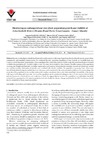Identificador persistente para citar o vincular este elemento:
https://accedacris.ulpgc.es/jspui/handle/10553/52384
| Título: | Monitoring an endangered and rare plant: population growth and viability of Lotus kunkelii (Esteve) Bramwell and Davis (Gran Canaria - Canary Islands) | Autores/as: | Naranjo Cigala, Agustín Díaz, Francisco Javier González-García, Aday Miguel Ramos, Ana Árevalo Sierra,José Ramón Salas Pascual, Marcos |
Clasificación UNESCO: | 2417 Biología vegetal (botánica) 250501-1 Biogeografía botánica |
Palabras clave: | Conservation Correlation Global warming Monitoring Protected areas |
Fecha de publicación: | 2018 | Editor/a: | 1300-008X | Publicación seriada: | Doga, Turkish Journal of Botany | Resumen: | Species monitoring is a valuable tool that can be used to answer a wide range of questions directly related to species conservation, management, and population improvement. We monitored the only remaining population of Lotus kunkelii on a monthly basis over 3 years to reveal important characteristics of the population that could help protect it. In this study, the main hypothesis to be tested is whether the population of L. kunkelii is stable or not. The study site is located in Gran Canaria. Monthly censuses of the population recording size (height and diameter), mortality, regeneration, and presence of reproductive structures in each individual were carried out, and this monthly information of variables was correlated with climatic variables. The population is growing (from 105 to more than 200 individuals during the studied time) at a slow pace and is restricted by the environmental conditions of its surroundings (the proximity of the population to the sea that cushions the weather conditions), but we also determined high vulnerability of the species with respect to flooding and heavy rain. However, the population can be considered endangered due to its low number of individuals, and also because it is restricted to a very small area of land. We suggest that to conserve the population new individuals should be protected from grazing where the natural population is found. Finally, the climatic changes predicted by the IPCC in this area should also be considered in future conservation plans. | URI: | https://accedacris.ulpgc.es/handle/10553/41809 | ISSN: | 1300-008X | DOI: | 10.3906/bot-1707-63 | Fuente: | Turkish Journal of Botany [ISSN 1300-008X],v. 42 (3), p. 362-369 |
| Colección: | Comentario |
Citas SCOPUSTM
2
actualizado el 08-jun-2025
Citas de WEB OF SCIENCETM
Citations
2
actualizado el 22-feb-2026
Visitas
37
actualizado el 11-ene-2026
Descargas
7
actualizado el 11-ene-2026
Google ScholarTM
Verifica
Altmetric
Comparte
Exporta metadatos
Los elementos en ULPGC accedaCRIS están protegidos por derechos de autor con todos los derechos reservados, a menos que se indique lo contrario.
